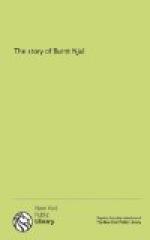They were rather late “boun,” but still they put to sea, and had a long passage, but at last they made Ingolf’s Head. There their shin was dashed all to pieces, but the men’s lives were saved. Then, too, a gale of wind came on them.
Now they ask Kari what counsel was to be taken; but he said their best plan was to go to Swinefell and put Flosi’s manhood to the proof.
So they went right up to Swinefell in the storm. Flosi was in the hall. He knew Kari as soon as ever he came into the hall, and sprang up to meet him, and kissed him, and sate him down in the high-seat by his side.
Flosi asked Kari to be there that winter, and Kari took his offer. Then they were atoned with a full atonement.
Then Flosi gave away his brother’s daughter Hildigunna, whom Hauskuld the priest of Whiteness had had to wife, to Kari, and they dwelt first of all at Broadwater.
Men say that the end of Flosi’s life was, that he fared abroad, when he had grown old, to seek for timber to build him a hall; and he was in Norway that winter, but the next summer he was late “boun”; and men told him that his ship was not seaworthy.
Flosi said she was quite good enough for an old and death-doomed man, and bore his goods on shipboard and put out to sea. But of that ship no tidings were ever heard.
These were the children of Kari Solmund’s son and Helga Njal’s daughter—Thorgerda and Ragneida, Valgerda, and Thord who was burnt in Njal’s house. But the children of Hildigunna and Kari were these, Starkad, and Thord, and Flosi.
The son of Burning-Flosi was Kolbein, who has been the most famous man of any of that stock.
And here we end the STORY of BURNT NJAL.
FOOTNOTES:
[Footnote 1: Guethbrandr Vigfusson.]
[Footnote 2: This word is invented like Laxdaela, Gretla, and others, to escape the repetition or the word Saga, after that of the person or place to which the story belongs. It combines the idea of the subject and the telling in one word.]
[Footnote 3: Many particulars mentioned in the Saga as wonderful are no wonders to us. Thus in the case of Gunnar’s bill, when we are told that it gave out a strange sound before great events, this probably only means that the shaft on which it was mounted was of some hard ringing wood unknown in the north. It was a foreign weapon, and if the shaft were of lance wood, the sounds it gave out when brandished or shaken would be accounted for at once without a miracle.]




